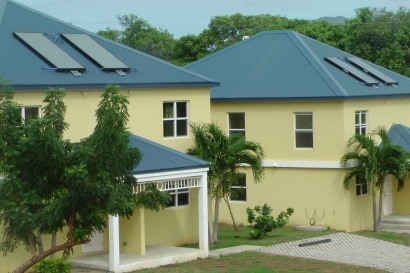
The document is the first ever Community Energy Strategy published by a UK government. It includes information on how communities can support a sustainable and secure energy system, help to reduce UK greenhouse gas (GHG) emissions and lower consumer bills.
The publication also explains how communities are already coming together to generate electricity and heat, reduce energy use and save money on energy bills. It brings together existing policies and initiatives with new actions in order to provide a coherent package of support for communities with regard to energy.
More than 5,000 groups have already been formed in the UK with the aim of transforming energy demand and use. These include collective switching schemes which help people to lower their energy costs through to community owned wind farms generating local jobs and revenue. Neighbourhood schemes have also helped with the insulation of domestic homes and energy efficiency strategies.
The UK community energy sector is still relatively small compared to countries on the European mainland, such as Germany or Denmark. However, DECC believes that the potential of the sector in the UK is huge. Estimates obtained by the department suggest that community schemes could supply enough electricity for 1 million homes by 2020 if the right level of support is provided. A recent survey for DECC found that that at least 42 percent of UK citizens would be interested in participating in community energy schemes if it helped to reduce energy bills.
The strategy has been welcomed by the Solar Trade Association (STA) and the Renewable Energy Association (REA). Both trade associations have been asked to work with community energy groups by the Energy Secretary, the Rt Hon Ed Davey MP. The REA additionally has developed a new web-based resource called the Renewables Marketplace which is an online platform aimed at helping community groups to contact and work with businesses in the sector.
“The public are very concerned by the lack of competition in our energy markets and poll after poll shows they back renewable energy” said STA Head of External Affairs Leonie Greene. “So it's great to see the UK Government recognise the vast potential for everyday communities to directly own renewable energy and by doing so, to break open our consolidated electricity sector. International experience shows it is bottom-up investment by everyday people and organisations that can really drive renewables. At the same time this gives people real ownership of the energy they depend on, and increases support for local schemes. We want to see as much community-driven solar as possible, but it is starting from a very low base in the UK and faces many barriers, including cultural novelty. Perhaps the most exciting potential is for industry partnerships with local communities to accelerate progress.”
Among the initiatives considered by the strategy is engagement with private sector renewable developers in community shared ownership schemes to develop new partnership models. A new £10 million Urban Community Energy Fund will work alongside the £15 million Rural Community Energy Fund that was announced by the government last year while the government’s existing Green Deal energy efficiency scheme is to be quadrupled to £80 million in order to increase infrastructure and capacity across local authorities. DECC’s Heat Networks Development Unit is also partnering with councils in one of the largest local heat network development programmes ever conducted.
The strategy is divided into 11 sections with Annexes and includes information on electricity and heat generation, impact measurement, energy reduction, demand management and cost reduction.
For additional information:
Department of Energy and Climate Change (DECC)

